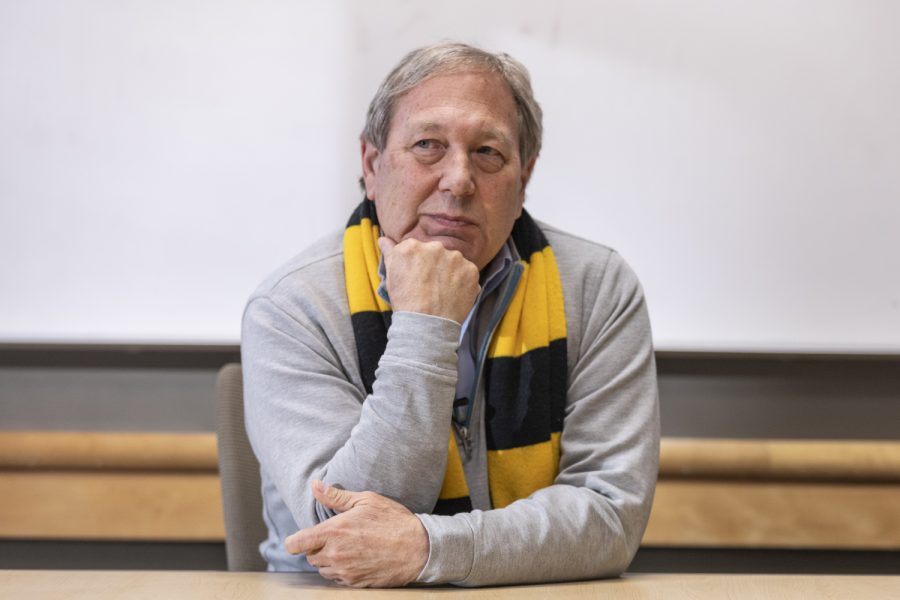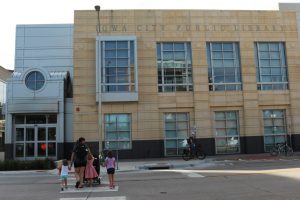Shared governance groups on campus prepare for search for next UI president
Branches of the University of Iowa’s shared governance are preparing for what a new president search will look like after President Bruce Harreld announced his retirement plans on Oct. 1.
University of Iowa President Bruce Harreld talks with members of the Daily Iowan during an interview at the Adler Journalism Building on Thursday, Feb. 13, 2019. President Harreld has been the president at the university since November 2, 2015.
October 4, 2020
As the University of Iowa prepares for a new university president search, representatives of students and faculty are prepared to fight for their voices to be at the table.
The 21st President of the University of Iowa Bruce Harreld announced his plan to retire on Thursday once a successor is selected by the state Board of Regents, which governs the three state universities. His goal, he told The Daily Iowan, is to give ample time to search for the next head Hawkeye and remove the need for an interim president.
As the process to find a new president begins, members of UI Faculty Senate, Faculty Council, Staff Council, the Graduate and Professional Student Government, and Undergraduate Student Government, are looking to make the process as simple and transparent as possible. That follows backlash from faculty for a search process that includes an American Association for University Professors sanction and a vote of “no confidence” in the state Board of Regents after the board selected Harreld in 2015, suggesting the regents didn’t follow shared-governance guidelines.
Regents president Michael Richards was not a member of the board when Harreld was selected, but he told the DI the regents would commit to meetings with shared governance groups. An Oct. 5 regents meeting will address the details of the next steps in the search process.
Richards said the did not face the kind of backlash Harreld’s selection process did, and he wants the process at the UI to be similar.
“We will sit down and we will take into consideration the commitments we have made to faculty in regard to shared governance. I was president with the Iowa State process, which was considered to be very acceptable,” Richards said. “I personally would commit that we’ll have the same type of search or better at the University of Iowa,” Richards told the DI.
The regents have not yet announced a search committee. The board will meet Oct. 5 to discuss the search.
Harreld told The Daily Iowan he plans to retire when his contract ends, but in order to account for COVID-19 and mitigate the need for an interim appointment, the state Board of Regents and the UI are starting the search for a new university president now.
As The Daily Iowan previously reported, Harreld’s contract ends in June 2023, but he plans to remain at the university until his position is filled.
After working with Harreld for three years, Undergraduate Student Government President Connor Wooff said the selection of the next president will be a crucial moment of change for the university.
“We want to thank him for his time as president and his leadership he has provided the university,” Wooff said.
Then-student government president Liz Mills said the backlash Harreld received when he initially started his term made the transition period more difficult. She said she hopes that can be avoided this time around.
“Our shared governance opinions were considered,” Mills said. “…Faculty, students, and staff are welcome to their own opinions, and I think it is crucial that shared government is allowed to have a voice, and typically that isn’t an issue at the [UI]. I hope shared governance is open minded and treats candidates fairly and is welcoming to whoever comes to campus next.”
In June 2016, the American Association of University Professors (AAUP) added the UI to its sanction list after finding that the selection by the regents of President Harreld “seriously infringed Association-supported standards of college and university governance.”
In 2017, the Best Practice for Faculty Engagement in a UI Presidential Search guidelines were released to address the concerns in the AAUP sanction report. The report recommended that at least 50 percent of the search committee be made up of faculty, and to allow adequate time for feedback from the committee and community on the final candidates.
In 2015, only a third of the search committee were faculty members, and Harreld’s appointment was voted upon by the regents only one day after a contentious public forum on campus.
In an email to the DI, Hans-Joerg Tiede, Senior Program Officer and Researcher at the American Association of University Professors said “We expect that the next presidential search at the University of Iowa will be conducted according to AAUP principles.”
Yockey said the best search practices document highlights shared governance guidelines for search committees to follow while selecting a candidate for the UI’s next president.
“At least half of the search committee members need faculty from multiple disciplines and tracks to be included so that the search process adheres to the university’s goals for diversity, equity and inclusion,” Yockey said. “Those will be our primary points of emphasis.”
Though it wasn’t expected when she initially started her position, Graduate and Professional Student Government President Mackensie Graham said she is prepared to begin the search process and plans to ensure students’ voices have a seat at the table.
“We want this process to be open and accessible to all [UI] students,” Graham said. “It’s really important to be transparent…We want to hire somebody who will be a good addition to the team that people believe in and will follow. I hope there are numerous opportunities for round tables and public comment.”
Because of the pandemic, Yockey said planning a search to hire a new UI president could take anywhere from 12-24 months. He said the Faculty Senate’s primary focus for the search is to advocate for the best practices to be followed by the Iowa Board of Regents and committee staff.
“I’m hopeful that we’ll get started, relatively soon,” Yockey said. “At the same time, I think one of the lessons from the prior search is that we want to do it carefully and deliberately.”
Wooff said USG has been given a chance to make a lasting impact on the university to help select the university’s next president.
“I think that as we look at the challenges that we’re dealing with as a university such as COVID-19, to Black Lives Matter, to the severe budget implications of the economy … I think that what we’ll have to look for in potential candidates is their ability to work on these issues across the university,” he said.
As a part of the presidential search committee, Yockey said the Faculty Senate has expectations for the next president to have experience in an administrative position within higher education as well as someone who can be tenured as a full professor in his or her discipline. He said that he is open minded in using an internal or external search to find candidates for the position.
“I think sometimes we overlook really highly qualified people in our own community. Perhaps, bringing a level of innovation that is not as easy to find internally,” Yockey said.
Regardless of who the committee selects as the UI’s next president, it is clear that shared governance will have a seat at the table – something Graham says is a necessity in a presidential search.
“We will definitely fight for a place at the table and I think that the [UI] places value on the concept of shared governance,” Graham said. “…Most of the time that concept is honored. I would hope that is the case with this process. too.”






